- Teacher: middle school
- Curriculum developer
- Corporate trainer
- Educational consultant
- Instructional coach
- Museum educator
- Nonprofit program coordinator
- Writer educational publishing
- Teachers at public schools across the Commonwealth and U.S.
- Teachers at Catholic schools across the Commonwealth and U.S.
- Teachers at independent schools such as The Valley School of Ligonier
Middle Grades Education 4-8
- Bachelor of Science
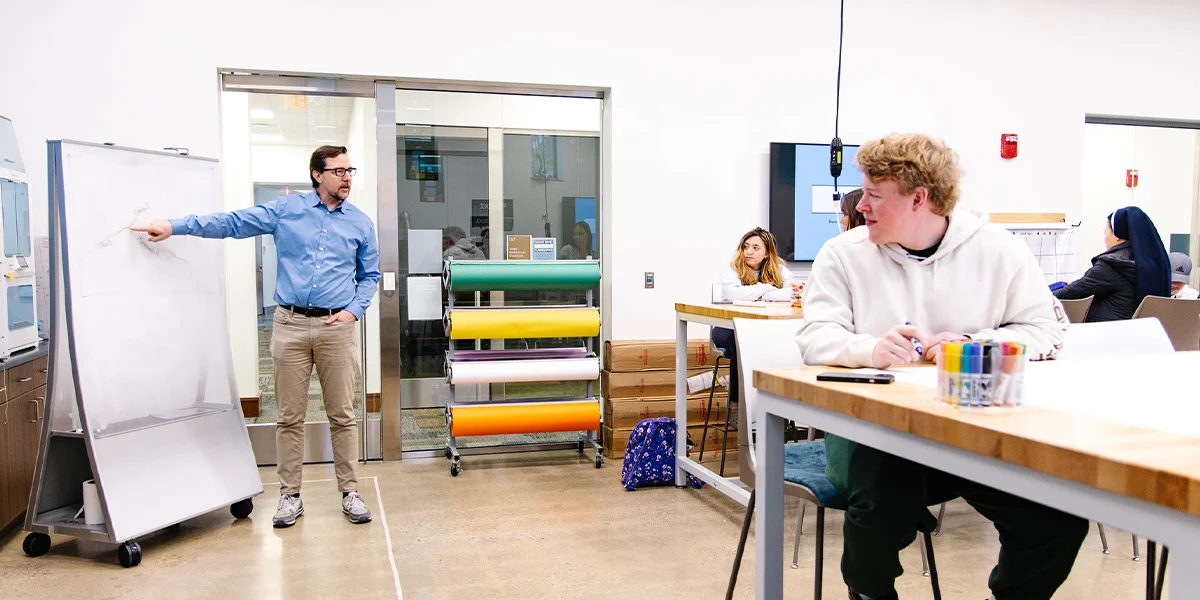
-
In This Section
Preparing Future Educators: Education Program for Grades 4-8
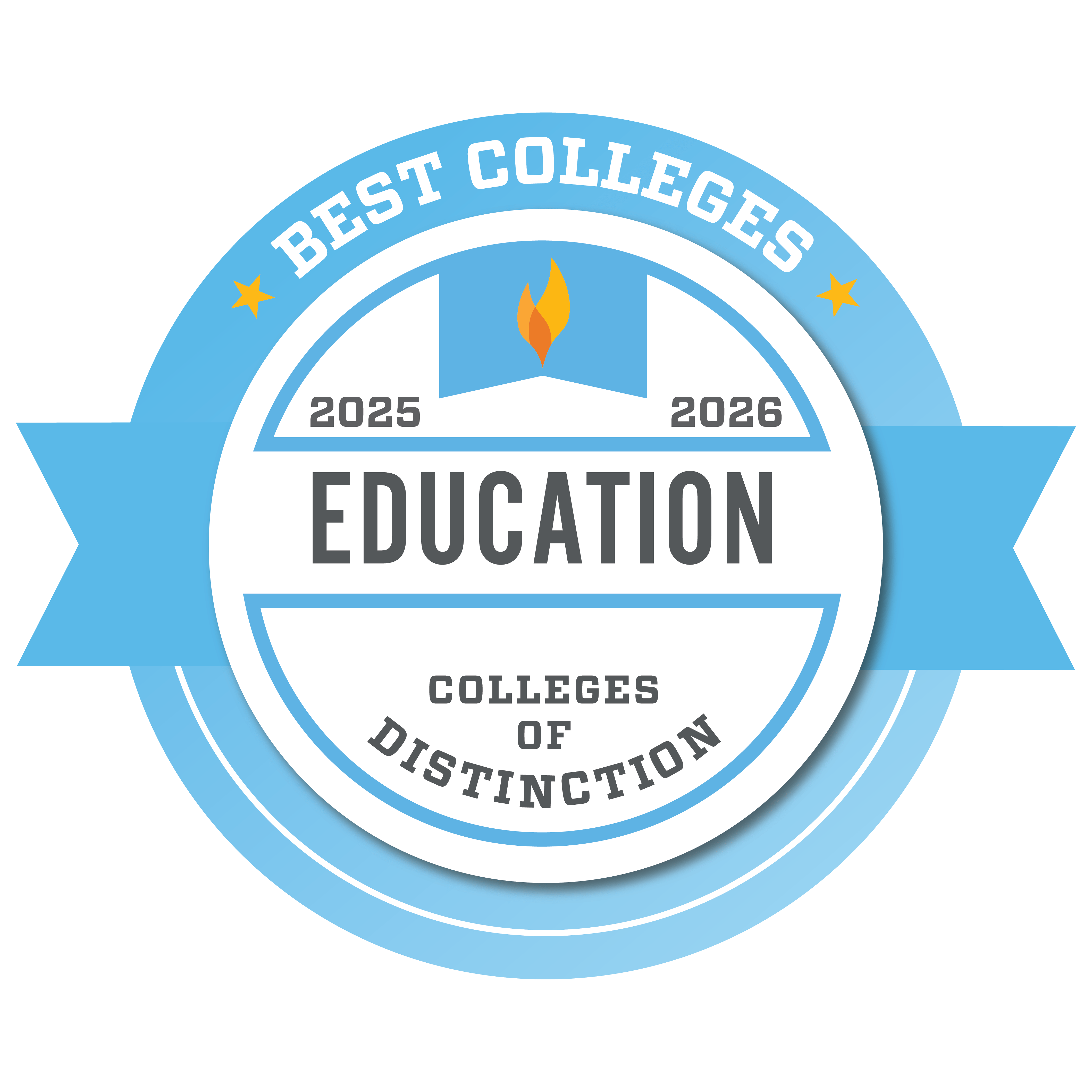 The middle level education program at Saint Vincent College prepares future educators to inspire and empower students in grades 4-8. Rooted in the college's commitment to academic excellence and the values of the Benedictine tradition, the program offers a dynamic blend of rigorous coursework, hands-on field experiences, and a focus on meeting the diverse needs of young learners. Students gain real-world experience beginning in their freshman year, partnering with local schools to observe, tutor, co-teach, and lead lessons. With an emphasis on differentiated instruction, innovative teaching strategies, and Pennsylvania Department of Education standards, the program equips aspiring teachers with the knowledge, skills, and confidence to create engaging and impactful learning environments for middle-grade students. Middle School Education students will be certified in language arts, mathematics, science, and social studies. Learn even more about what our education program offers students.
The middle level education program at Saint Vincent College prepares future educators to inspire and empower students in grades 4-8. Rooted in the college's commitment to academic excellence and the values of the Benedictine tradition, the program offers a dynamic blend of rigorous coursework, hands-on field experiences, and a focus on meeting the diverse needs of young learners. Students gain real-world experience beginning in their freshman year, partnering with local schools to observe, tutor, co-teach, and lead lessons. With an emphasis on differentiated instruction, innovative teaching strategies, and Pennsylvania Department of Education standards, the program equips aspiring teachers with the knowledge, skills, and confidence to create engaging and impactful learning environments for middle-grade students. Middle School Education students will be certified in language arts, mathematics, science, and social studies. Learn even more about what our education program offers students.
Related minors:
Disability Studies
Children's Literature
Children's Studies
STEM Education
Undergraduate Programs
Undergraduate Admission
Phone:
800-782-5549
Ext. 2500
Email:
admission@stvincent.edu
Program Highlights
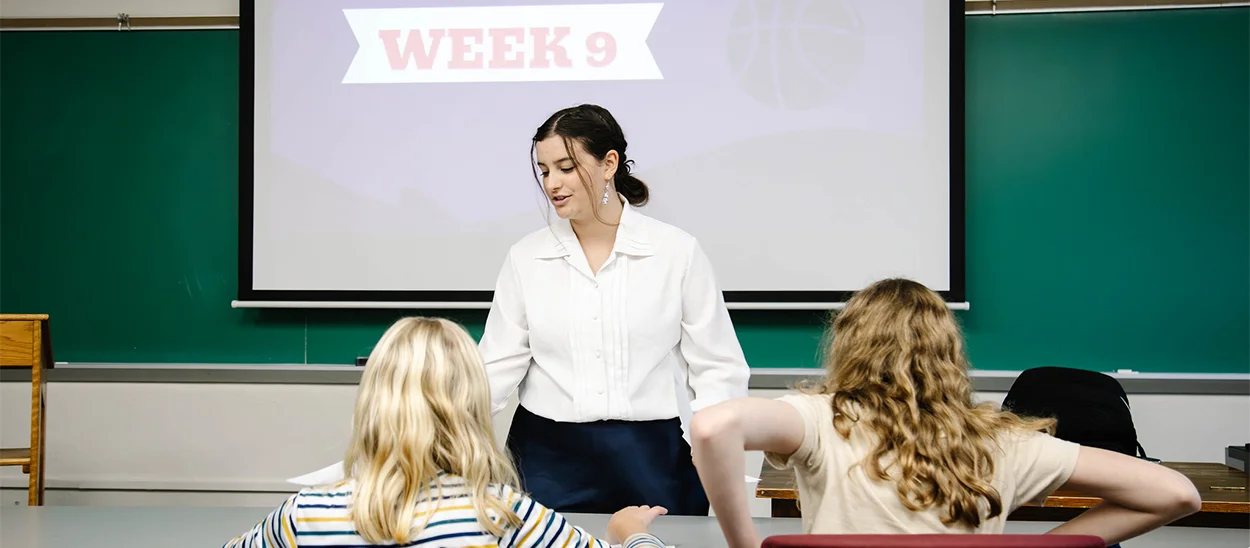
Frequent Field Experiences
Starting freshman year, students engage in field experiences that build essential skills in diverse settings. Integrated with coursework, these experiences allow immediate application of educational theories. Opportunities include the Bearcat B.E.S.T. program, environmental education at Winnie Palmer Nature Reserve, lesson planning for homeschooling students in our STEP-Up program, and immersive co-teaching. By their 14-week student teaching internship, students are fully prepared to lead. Learn more details about our educational field experiences.

Hands-On Service Opportunities
SVC’s Department of Education prioritizes service, encouraging students to engage meaningfully with the community. Through various opportunities, students develop empathy, leadership, and practical skills, and they can earn a service medal for commencement. A notable initiative is SVC Wraps for Kids, where students shop and wrap presents for disadvantaged children. This video highlights this wonderful service opportunity.
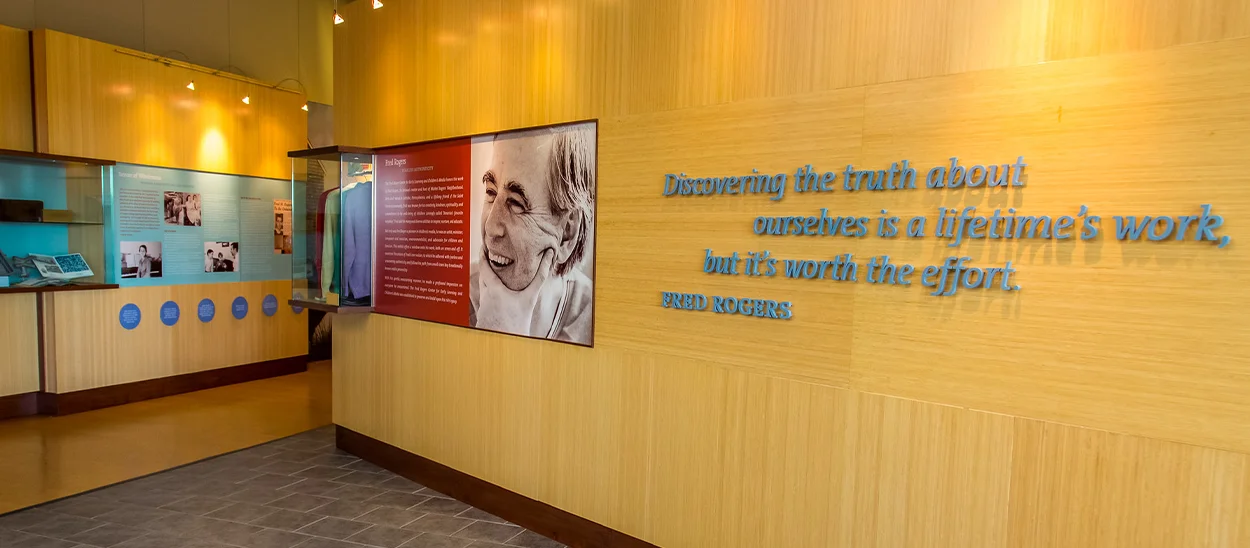
Partnerships with the Fred Rogers Institute
The Fred Rogers Institute and the SVC Department of Education collaborate to enrich student and faculty experiences through shared values of child-centered learning, compassion, and early development. This partnership grants education students access to resources like archival materials, workshops, and expert seminars, integrating Fred Rogers’ philosophy into their training.

Experienced and Approachable Instructors
Education faculty at Saint Vincent College bring extensive real-world experience, blending practical knowledge with a supportive, student-centered approach. As former teachers, administrators, and specialists, they offer relevant insights and personalized guidance. This experience makes them approachable mentors, committed to preparing future educators for success in diverse teaching environments.
Careers and Outcomes
An education degree from Saint Vincent College equips graduates with skills for impactful careers. Many become teachers in middle schools, specialize in special education, or take on leadership roles in administration, curriculum development, and instructional coaching. The skills gained—communication, organization, critical thinking, and adaptability—are also valuable in educational technology, museum education, corporate training, and nonprofit work. This degree prepares graduates to make a lasting impact in middle school education and beyond. Upon graduation, 98% of our students have gained employment in a teaching field, related field, or go on to graduate
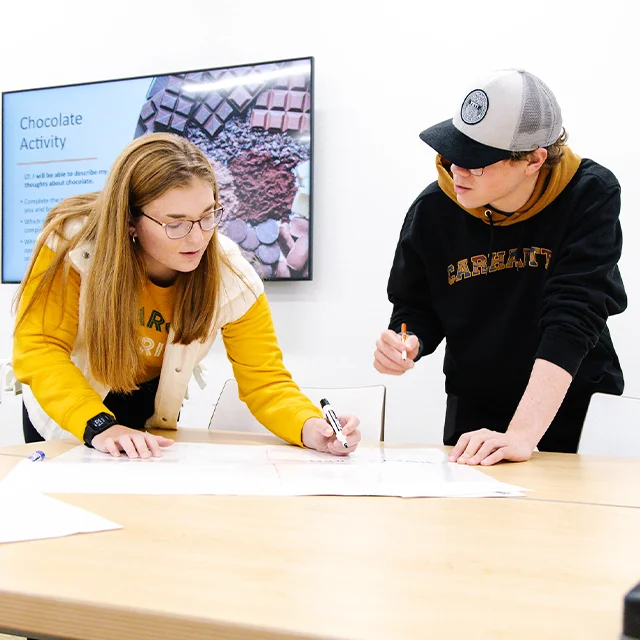
Student Success Stories
-

Alexandra Dillner, C’24
“The SVC education program stands out due to the Department of Education’s contagiously kind members, their unwavering dedication to student success, and their impactful words and lessons. The feeling that you are a human being in a classroom and not a number in an auditorium makes the experience all the more personal. The dedication that the education professors show when it comes to fostering relationships and rapport with their students is unmatched. If I had to go back to my senior year of high school and choose where I would become the best educator I can, I would choose Saint Vincent College every single time.”
7th grade math teacher, Troutman Middle School, North Carolina
-

Caitlyn Byrne, C’22
"My experiences within the SVC Education Department revealed to me what it truly means to be a quality educator. The coursework was meaningful and beneficial, and the wide array of opportunities offered to me outside the classroom courses expanded my knowledge and development. Most of all, the department is full of professors who supported me in my growth and demonstrated by example what an acceptable educator should be."
7th grade ELA teacher, Norwin Middle School
-

Taylor McCunn, C’22
“Saint Vincent gave me a place that felt like home and blessed me with amazing people and educators to help shape who I am today. The education department prepared me in so many ways from the minute I stepped on campus.”
Middle school social studies teacher, Indiana Area School District
Curriculum Requirements
The middle grades education major, housed within The School of Arts, Humanities, and Social Sciences, is enriched by a core curriculum that engages students in a diverse range of academic disciplines. Through foundational and advanced coursework, students explore interdisciplinary connections, deepening their understanding of themselves and gaining specialized knowledge to excel in their chosen field. Students will select a concentration to further deepen their understanding of a specific content area in English language arts, mathematics, science, or social studies.
-
Required Courses
General Education Studies - 52 credits
- CL 129 Adolescent Literature or CL 130 Children’s Literature
- ED100 Foundations of Education (Also fulfills Core Curriculum requirements.)
- ED142 Mathematics for Teachers
- ED 155 Geometric Measurement
- ED 290 Psychology and Education for Exceptional Students (Also fulfills Core Curriculum requirements.)
- HI 107 Topics in US History
- NSCI 125 Environmental Science
- PS 100 American Government
- PY 214 Adolescent Development
Middle School Education - 47 credits
- ED 102 Field Experience I: 4-8
- ED 115 Educational Psychology
- ED 205 Strategies and Techniques of Instruction
- ED 206 Field Experience II
- ED 208 Classroom Partnerships and Inclusion
- ED 234 Teaching of Science for Middle Learners
- ED 235 Teaching of Mathematics for Middle Learners
- ED 237 Teaching Humanities for Middle Learners
- ED 311 Field Experience III
- ED 320 Composition and Language Arts for Upper Elementary
- ED 381 Educational Testing
- ED 390 Promoting Cultural Competence and Diversity
- ED 400 Field Experience IV
- ED 401 Pre-student Teaching Seminar
- ED 410 Field Experience V
- ED 411 Professional Seminar
Content Concentration - 18 credits
Students take an additional 18 credits in a concentration area: English Language Arts, Mathematics, Science, or Social Studies
-
Key Courses
Field III: Students dive into real-world teaching experiences by teaming up with middle school educators in local school districts. Throughout the semester, they step into the classroom to observe, work one-on-one with students through tutoring, collaborate with teachers to co-teach engaging lessons, and even take the reins by designing and leading their own dynamic lessons. It's hands-on learning at its best!
Teaching Science to Middle Level Learners: This course immerses pre-service teachers in the fascinating world of children's thinking, exploring how middle-grade students engage with science. Experience the excitement of lab-based, hands-on learning and cooperative models as you navigate the wonders of physical, life, environmental, and natural sciences—plus cutting-edge technology and engineering. Combining engaging lectures with interactive lab sessions, this course lets you bring theory to life by teaching short, peer-reviewed lessons.
Adolescent Literature: This literature course allows students to explore recent trends in young adult literature which helps middle schoolers develop empathy, critical thinking, and a love for reading by presenting relatable characters and situations. It also addresses relevant social and emotional issues, aiding their personal growth.
Facilities and Resources
Makerspace in Latimer Library
The Makerspace at Saint Vincent College is a dynamic, hands-on learning environment essential to education programs. Equipped with tools for 3D printing, robotics, coding, and more, it helps students explore creative teaching strategies that integrate STEM and arts. Whether designing interactive science experiments, creating art projects with new technology, or developing games that support mathematical concepts, education majors gain practical experience in designing engaging hands-on activities for 21st-century classrooms.
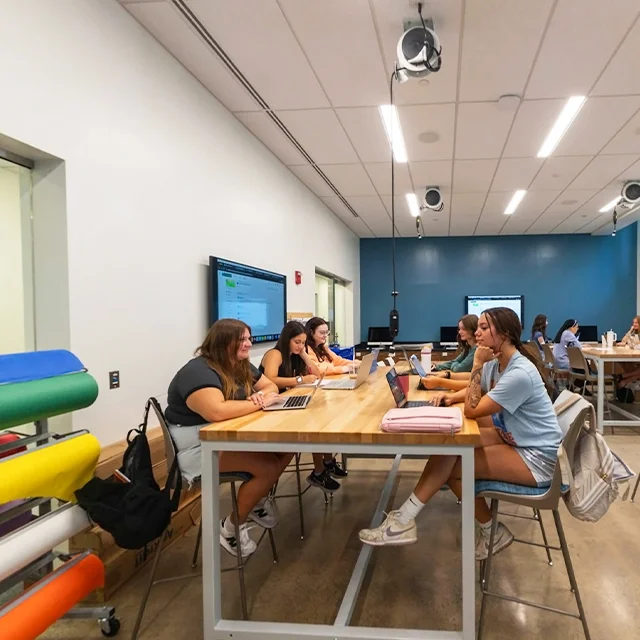
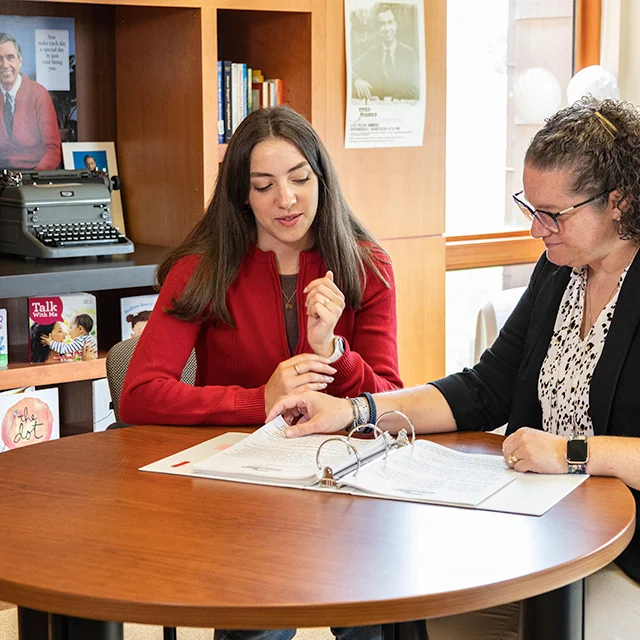
Fred Rogers Institute
The Fred Rogers Institute and the Education Department at Saint Vincent College have partnered to enrich education for students and faculty. This collaboration, rooted in fostering child development, early learning, and the values championed by Fred Rogers himself, gives students access to the Institute’s resources, workshops, and expert staff.
Education Technology Lab
The Education Technology Lab is a dynamic hub designed to prepare future educators for the modern classroom. Featuring state-of-the-art tools such as a Promethean Board, telepresence robots, and iPads, the lab enables students to engage with cutting-edge educational technology. The Promethean Board, telepresence robots, and iPads collectively enhance interactive learning, remote collaboration, and digital literacy, equipping education majors with the skills and confidence to effectively incorporate technology into diverse learning settings.
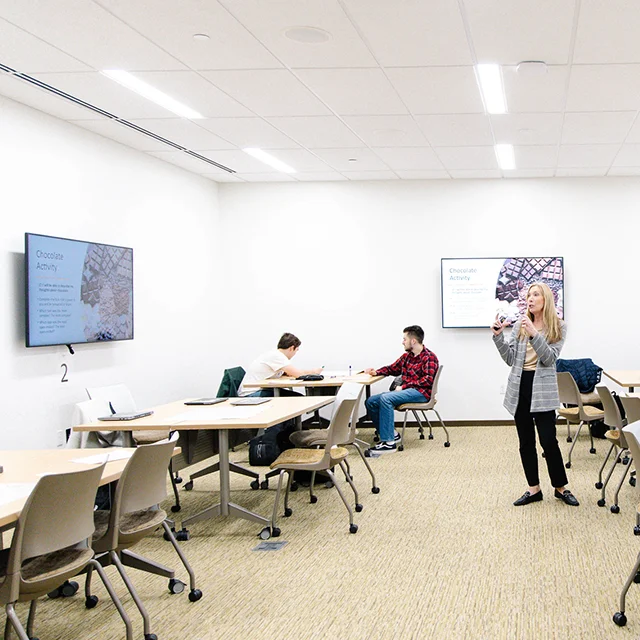
Program Distinctives
Pennsylvania Department of Education Accreditation
Saint Vincent College’s teacher preparation programs are fully accredited by the Pennsylvania Department of Education (PDE), ensuring that our curriculum, faculty, and field experiences meet the highest standards of educational excellence. This accreditation means that our programs have been rigorously evaluated and align with state requirements, preparing graduates to be highly qualified, effective educators ready to enter the teaching profession. Through PDE accreditation, students in our education programs are eligible for certification in Pennsylvania upon graduation, enabling them to teach in their specific areas of study. The accreditation process also reflects our commitment to continuous improvement, as we regularly assess and enhance our programs to stay current with educational best practices and evolving standards in the field.
NASDTEC Interstate Agreement
Through the NASDTEC Interstate Agreement, Pennsylvania allows individuals who have completed a teacher preparation program or are already certified teachers in other states to receive Pennsylvania teaching certification through reciprocity. Pennsylvania-certified teachers can also transfer their certification to other states. Each state may have different testing and application requirements, so candidates should check the NASDTEC website for specific information on transferring their certification.
Undergraduate Programs
Undergraduate Admission
Phone:
800-782-5549
Ext. 2500
Email:
admission@stvincent.edu
